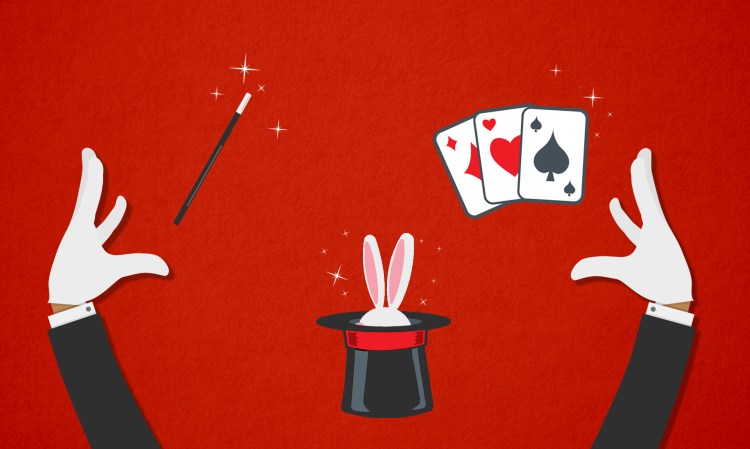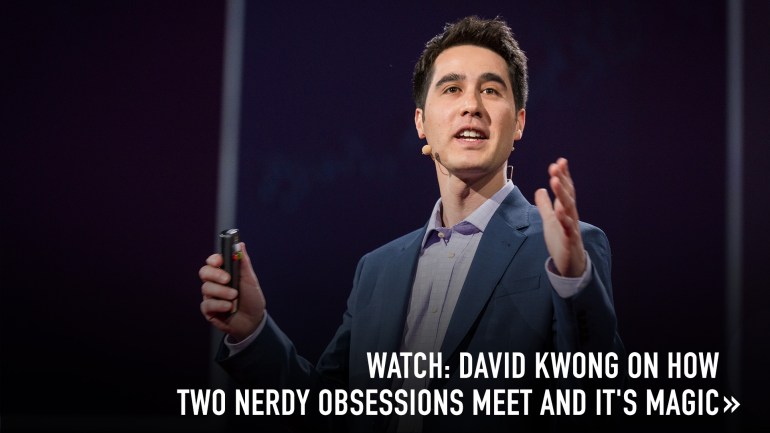
Preparation is the key trick used by magicians — and it can help you conjure big wow moments, too, says David Kwong.
In 2014, Hollywood director Edgar Wright, known for offbeat films like Shaun of the Dead, Hot Fuzz, Scott Pilgrim vs. the World and next month’s Baby Driver, invited me to his home so he could learn “how a magician thinks.” I invited my magician pal Blake Vogt to help me “load up.” Loading up is magician-speak for the advance organization and placement of devices that will later be used to create a magical effect. Close-up illusionists may load up by stuffing their pockets with coins or extra cards. Whatever equipment is needed, it’s placed so it can be accessed the instant it’s needed without the audience’s knowledge — inside the gap between what they can see and what they will perceive. What they’ll perceive, of course, is the seemingly spontaneous effect, the payoff of the preparation.
Blake, in my opinion, is the best trick creator working today; he’s been hired by illusionists like David Blaine (Ted Talk: How I held my breath for 17 minutes) and Dynamo to create magic for their TV specials. What he and I engineered was the story shaping Wright’s magic lesson. It began with our arriving fifteen minutes late. We apologized for not being able to find the house, then we launched into a demonstration of sleight-of-hand tricks. We chatted about the parallels and distinctions between magical deception and con artistry. After a while, we started wrapping up. Then Edgar asked for one last trick.
“Well, we’ve kind of done all our best stuff,” I said. “But maybe, if there’s an outdoor space — like your driveway — we can try one more.”
Magicians start their planning process by first envisioning the act’s ultimate wow.
Wright offered his backyard, and we headed out through the kitchen. The house had a deck that looked out over a green lawn bordered by bushes. Standing on the edge of the grass, I asked our host to name any playing card. He chose the five of hearts. Blake instructed him to point to a spot of his choice in the yard. Edgar settled on a row at about two o’clock from where we stood. After the three of us reached the spot, I told the director to dig into the mulch. Buried there was a folded playing card. Edgar unfolded it to find — drumroll, please — the five of hearts.
Under normal circumstances, I’d keep the method behind the trick a secret, but in this case Wright had asked me to illustrate the magician’s process. I wanted to let him in on the strategies Blake and I used — and one was that we designed each act in reverse.
Magicians start their planning process by first envisioning the act’s ultimate wow, the moment when something “impossible” happens. Then we work backward to identify and craft the pieces needed to bring about this effect. No amount of preparation is too much.
In Edgar’s living room, I played him a video showing how Blake and I had loaded up. Knowing our “magic lesson” needed to culminate in the aha moment of his discovering the card he’d named at random, we reverse-engineered the discovery to create the illusion of spontaneity. Edgar shook his head with disbelief as he watched footage of us burying 52 playing cards in his yard earlier that day, which we placed in a pattern we could memorize.
But even though Blake and I had already been to the house to bury the cards, we showed up late for our meeting and said we couldn’t find the house. Also, we didn’t offer to do one last trick; we waited to be asked. At which point, we acted reluctant. We suggested doing it in the unadorned driveway, leaving Edgar to steer us to his backyard. Every beat of the story had been scripted in advance. However, we did not reveal how we’d gotten Edgar to point to where his card lay — the technique we used was a trade secret and we’d be persona non grata in our industry if we told him.
Staying at least one step ahead of the spectator is a fundamental rule in magic.
Edgar had requested insight into how magicians think, and the real lesson was the lengths to which we’d gone to prepare for this trick. Our load-up was extreme, purposeful and secret. And it yielded an unforgettable impression, which the story around it reinforced. Staying at least one step ahead of the spectator is a fundamental rule in magic. It’s the whole point of loading up — you prepare discreetly and to such an extreme that you’re ready for any and all contingencies. After all this secret front-loading, the advantage is resoundingly yours, but no one else will know that. And once you’ve pulled off your grand feat, they won’t be able to figure out how you did it. They’ll just think you’re superhuman.
Getting ready to do something great isn’t always easy, but it is more important than you might realize. Smart leaders, like magicians, know there’s a science to preparation. The process of proactivity starts with envisioning the effect you ultimately want to achieve. A can’t-lose business deal, or the magical illusion that will launch your career? The more important your objective is to you, the more important it is that you load up carefully. For critical events, I actually go to such extremes of preparation that my acts sometimes fool other magicians, who can’t imagine that I’d prepare more than they do.
Consider the goals that matter most in your career and personal life, and ask yourself how you can best prepare to reach those objectives. What do you need to learn to put yourself at the top of your game? What skills will give you the greatest advantage? What could be added to your repertoire to help you jump the gap between your particular audience’s expectations and a triumphal performance?
Magicians, too, keep close track of their audiences to safeguard the element of surprise.
Perhaps you could target an entirely new way to meet your audience’s needs — here’s a real-life example. Lorenzo Zambrano, CEO of the Mexican cement company Cemex, wanted to grow his profits. Because mixed concrete has an extremely short shelf life, it has to be delivered right before the customer is ready to pour it. Customers were penalized –and the product was wasted — if circumstances forced them to change orders.
Zambrano investigated his options and decided that by refining his delivery methods, he could gain a significant edge over the competition. He and his team secretly studied delivery methods in other industries, like FedEx, pizza delivery companies and trucking and ambulance services. He saw they used digital systems, which he then deployed so that Cemex trucks could be redirected in real time to optimize routing across large service areas. If one customer postponed an order at the last minute, the delivery could instantly be rerouted to another who’d just placed an urgent order.
Because of his changes, Cemex grew into one of the largest ready-mix concrete companies in the world. The preparation that paved the way for Zambrano’s success was both exhaustive and surprising. By keeping his research secret, he ensured those operating under the old methods had no glimmer of the threat he posed — until he unleashed his new operations and roared past them.
Audience research is essential. Zambrano had to understand his customer’s habits, problems and needs before he could win their business. But they weren’t his only audience; he also wanted to surpass his competitors so he had to know their practices and assumptions well enough to keep them in the dark, even as he was outsmarting them.
Magicians, too, keep close track of their audiences. One reason is to safeguard the element of surprise. Ideally, no spectator should ever see the same trick twice, which could put the illusion in jeopardy and drain the act of its wow factor for that individual. Magicians must remember who’s seen each act before and deliver something new if an audience member returns. I punch the following information into a spreadsheet after every show: the date, the venue, who was there, and what tricks I performed. I try to input every name I can recall. The idea is to use your memory bank to help you develop the relationships that matter most to you, while safeguarding yourself against those that spell danger.
If you want to command your audience, use every legitimate tool at your disposal.
But what if you’re planning to meet an audience for the very first time? In magic, nothing stuns “random” volunteers more than when I mention personal details that I, a stranger, should have no way of knowing. Today’s magicians use Facebook, Google, Tinder, Twitter, Instagram, YouTube, LinkedIn, Match, MySpace, Pinterest, Tumblr, etc. For all the concerns about privacy, most people freely release more data than they realize or remember. If you want to command your audience, use every legitimate tool at your disposal. Research your potential employer or employee, clients, colleagues or interviewer. Prepare for a blind date by loading up on information about this stranger — and not just from OKCupid or the friend who set you up.
Deep data is power, as more and more businesses are proving. These days, the corporate approach to loading up is to harness every available technology to learn as much real-time information as possible about individual customer behavior, then use the data to improve the customer’s experience as it’s happening.
Disney’s MyMagic+ system allows Walt Disney World Resort guests to plan trips with an app called My Disney Experience. This helps Disney load up information about them in advance. When families arrive at the resort, they’re given a MagicBand bracelet that allows them to skip long lines and easily access extras, such as souvenir photos. The bands also report where their wearers are, so Disney can text their phones suggesting how to get around congestion or where to find a cold drink.
By better understanding the needs and patterns of visitors, Disney can enhance their experience, which also helps solidify their brand loyalty and keep them returning. The collective data from MyMagic+ also amounts to information that Disney can use in planning park improvements. In truth, Disney gains more than guests do from MyMagic+, but the illusion is that the guest reaps all the rewards.
In magic or in business, it’s important to be judicious in deploying the data you’ve secretly loaded up. Mind the gap between what your audience thinks you know and what you actually know, and use your insights to awe them but not reveal anything that might compromise your advantage. Whether your stage is a kitchen or a proscenium, a classroom or a boardroom, every step of preparation is important. Remember: Magicians spend hundreds of hours on a move that transpires in two seconds, because it’s worth it to us. Once you’ve identified a goal that’s worth your best effort, load up radically and stealthily in ways that no one else can imagine. Your moment will come and when it does, all the care you’ve put into your preparation will make your accomplishment appear effortless — and you look like a genius.
Excerpted from the new book Spellbound: Seven Principles of Illusion to Captivate Audiences and Unlock the Secrets of Success by David Kwong. Reprinted with permission from Harper Business, an imprint of HarperCollins Publishers. © 2017 David Kwong.













